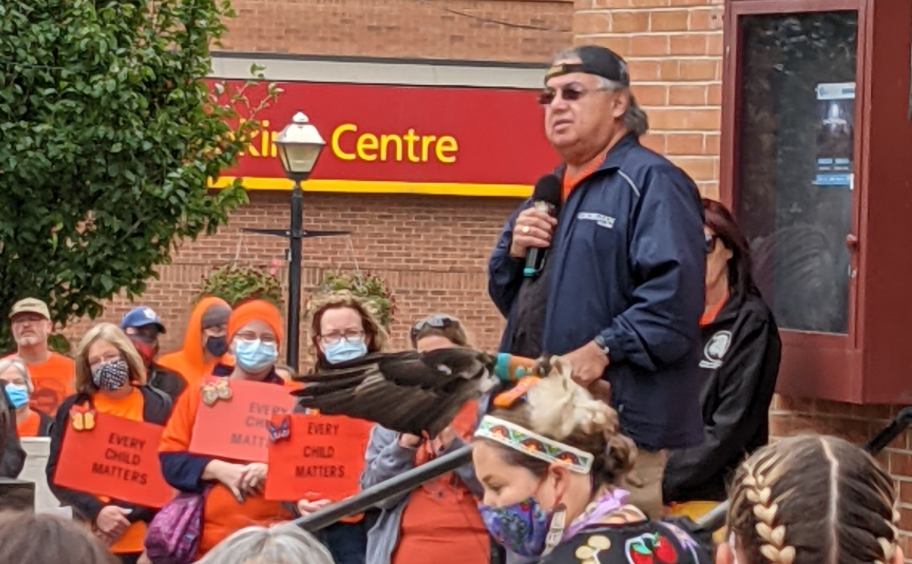For the Indigenous, election offers little hope

Local elder Jeff Monague addresses those who gathered at the Orillia Opera House to mark the first National Day for Truth and Reconciliation. |
From MidlandToday, June 6, 2022
By Jeff Monague
It is Indigenous History Month and during this month I will offer some pieces of the past — such as this account taken from historical record (Huronia Museum Archives) as well as oral history of the Anishinaabeg from Christian Island, my home community.
On a warm spring day in late May of 1955, just as the ice had finally melted on Georgian Bay, a delegation of First Nation chiefs and councillors, Ontario political candidates and their assistants boarded the ferry at Cedar Point to travel across the water to Christian Island.
The delegation of chiefs and councillors travelled from Waasaaksing (Parry Island), Mnjikaning (Rama) and Six Nations near Brantford. They were there to mark a new relationship between the Province of Ontario and the First Nations. This would be the first time that “Indians” were allowed to vote in Ontario elections.
The historic gathering was preceded by a traditional customary gift exchanges between each delegation before proceeding to speeches of welcome and expectation from the chiefs present at this historic meeting. It was expected that this new relationship would assist First Nations people greatly and help them to recover from the poverty that had blanketed their communities following the loss of lands and the right to hunt and fish in their traditional territories.
With this conceding of the right to vote, there was great expectation. There was only hope.
Local candidates for the local political parties in Simcoe County addressed the chiefs and councils and each affirmed their wish to assist First Nations while apologizing for knowing little about their plight. They each promised to take the concerns of the First Nations people to the provincial Legislature.
That year, 1955, would have been 90 years since the traditional Doodemag (Doe-deh-mug) Clan system was wrestled away from our ancestors at Beausoleil Island by the Canadian government.
Our people were made to renounce their Doodemag and adopt the Canadian electoral system that is still in place today. The hereditary chiefs would have been relegated to the sidelines as an elected chief and council led their people to the shores of Christian Island in 1886, our third and last displacement.
It is now 67 years since that historic meeting in 1955 and only a few candidates for federal or provincial elections have ever visited Christian Island to tout their electoral platform.
The ones that did have always echoed the words of the first delegation in 1955: We know little about you but we will take your concerns to the government if elected. One other fact: those that did take the time to visit, were remembered and respected for their visitation — especially those who actually take the time to knock on doors or those that arrange to speak to the people and acknowledge them.
That acknowledgement is as rare an occurrence as all of those promises of long ago (1955).
So we wait. Holding onto the one thing we have: hope.
Jeff Monague is a former Chief of the Beausoleil First Nation on Christian Island, former Treaty Research Director with the Anishnabek (Union of Ontario Indians), and veteran of the Canadian Forces. Monague, who taught the Ojibwe language with the Simcoe County District School Board and Georgian College, is currently the Superintendent of Springwater Provincial Park. His column appears every other Monday.
Read the article here









Leave a Reply